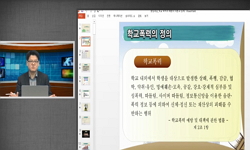조선의 정치인들은 사회와 국가의 이상을 설정하고 따를 뿐 아니라, 그 이상을 현실에서 바로 실현할 수 있다는 강한 확신을 실천했다. 조선시대의 이상주의는 일원적 논리에 의한 국가운영...
http://chineseinput.net/에서 pinyin(병음)방식으로 중국어를 변환할 수 있습니다.
변환된 중국어를 복사하여 사용하시면 됩니다.
- 中文 을 입력하시려면 zhongwen을 입력하시고 space를누르시면됩니다.
- 北京 을 입력하시려면 beijing을 입력하시고 space를 누르시면 됩니다.
https://www.riss.kr/link?id=A106977807
- 저자
- 발행기관
- 학술지명
- 권호사항
-
발행연도
2019
-
작성언어
Korean
-
주제어
이상주의 ; 민본주의 ; 폭력 ; 전제권 ; 반정(反正) ; 붕당정치 ; 세도정치 ; 농민군(農民軍) ; Idealism ; Peasant-centered Policies ; Violence ; Despotism ; Restoration of Righteousness ; Political Factions ; In-Law Politics ; Peasant Army
-
자료형태
학술저널
-
수록면
1-20(20쪽)
- 제공처
-
0
상세조회 -
0
다운로드
부가정보
국문 초록 (Abstract)
조선시대에는 크게 볼 때 국가의 폭력 독점이라는 원칙이 자리 잡았으며, 군인들이 그 자체의 힘과 논리로 기존 정치질서를 일거에 뒤엎는 군사 쿠데타는 발생하지 않았다. 국왕의 사적 기구이든 정부의 공적 기관이든 비밀경찰에 해당하는 조직 또한 없었다.
세습 군주제는 일관적 논리 위에서 안정적인 질서를 구축하지만, 어리석거나 무도한 국왕이 출현할 수 있다는 결정적인 약점을 지닌다. 조선시대 두 차례 수행된 반정은 그러한 문제를 바로잡는 수단이었다. 반정은 왕조체제의 형식논리 위에서 재위 중인 국왕을 축출하고 그의 동의나 승인 없이 새 국왕이 즉위하여 조정을 개편하는 정치과정이었다. 17세기에는 신료들이 붕당으로 결집하여 공존과 견제의 질서 위에서 정치를 주도했다. 그러나 붕당 간의 경쟁을 제도화하지 못한 상태에서 대립과 투쟁이 격화되었다. 18세기에는 국왕이 초월적 권위를 정립하고자 하는 노력을 기울였는데, 이것은 국왕과 신하들이 공통의 가치를 추구해야 한다는 전통적인 논리를 부정하는 것이었다. 19세기에는 언관의 퇴조에서 보이듯이 조선 정치체제가 한계에 도달했다. 국가권력이나 구조적인 폭력에 맞서는 것은 농민 일반의 실천 역량이 될 수밖에 없었다.
조선의 정치인들은 사회와 국가의 이상을 설정하고 따를 뿐 아니라, 그 이상을 현실에서 바로 실현할 수 있다는 강한 확신을 실천했다. 조선시대의 이상주의는 일원적 논리에 의한 국가운영, 민본주의의 추구 등으로 나타났다. 사회를 일관되고 정제된 질서 위에서 운영하고자 하는 이상주의에는 노비제와 같은 억압적 체제도 포함되었다.
조선시대에는 크게 볼 때 국가의 폭력 독점이라는 원칙이 자리 잡았으며, 군인들이 그 자체의 힘과 논리로 기존 정치질서를 일거에 뒤엎는 군사 쿠데타는 발생하지 않았다. 국왕의 사적 기구이든 정부의 공적 기관이든 비밀경찰에 해당하는 조직 또한 없었다.
세습 군주제는 일관적 논리 위에서 안정적인 질서를 구축하지만, 어리석거나 무도한 국왕이 출현할 수 있다는 결정적인 약점을 지닌다. 조선시대 두 차례 수행된 반정은 그러한 문제를 바로잡는 수단이었다. 반정은 왕조체제의 형식논리 위에서 재위 중인 국왕을 축출하고 그의 동의나 승인 없이 새 국왕이 즉위하여 조정을 개편하는 정치과정이었다. 17세기에는 신료들이 붕당으로 결집하여 공존과 견제의 질서 위에서 정치를 주도했다. 그러나 붕당 간의 경쟁을 제도화하지 못한 상태에서 대립과 투쟁이 격화되었다. 18세기에는 국왕이 초월적 권위를 정립하고자 하는 노력을 기울였는데, 이것은 국왕과 신하들이 공통의 가치를 추구해야 한다는 전통적인 논리를 부정하는 것이었다. 19세기에는 언관의 퇴조에서 보이듯이 조선 정치체제가 한계에 도달했다. 국가권력이나 구조적인 폭력에 맞서는 것은 농민 일반의 실천 역량이 될 수밖에 없었다.
다국어 초록 (Multilingual Abstract)
Joseon (1392-1910) politicians believed in idealism, which meant not only establishing and following the ideals of society and the state, but also implementing them immediately. They tried to run the state and society on consistent principles and to p...
Joseon (1392-1910) politicians believed in idealism, which meant not only establishing and following the ideals of society and the state, but also implementing them immediately. They tried to run the state and society on consistent principles and to promote peasant-centered policies. Their idealism included the repressive social order such as nobi system as well as positive aspects. In the Joseon period, despite some exceptions, the state monopolized violence, and there was no military coup that soldiers overthrew the existing political order with their own power and logic. There was no secret police, whether it was a private organization of a king or a public body of the government. Hereditary monarchy had the advantage of stability, but it had the critical weakness that a foolish or tyrannical king might emerge. The Restoration of Righteousness(Banjeong), carried out twice in the Joseon Dynasty, was a means to correct such problems. Banjeong was a political process in which the ruling king was expelled against his will and the government was reorganized by a new king. It was done according to the systematic logic of the dynasty. In the 17th century, rulling class gathered into political factions and participated in politics of coexistence and mutual control. Confrontations and struggles got intensifyed for the lack of institutionalization of competitions among the factions. In the 18th century, the kings made efforts to establish transcendental authority, but it ended in denial of the traditional principle that a king and his politicians should pursue common values. In the 19th century, the political system of Joseon went into a collapse, as evidenced by the disappearance of serious criticism within the government. It was up to the ordinary peasants to carry out the struggle against state power and structural violence.
목차 (Table of Contents)
- I. 조선시대의 이상주의
- II. 문반 중심의 정치질서
- III. 군주 전제권 견제
- IV. 신료-국왕의 정치 주도권의 추이
- V. 18~19세기의 체제 변동
- I. 조선시대의 이상주의
- II. 문반 중심의 정치질서
- III. 군주 전제권 견제
- IV. 신료-국왕의 정치 주도권의 추이
- V. 18~19세기의 체제 변동
- VI. 19세기 이후 민(民)의 실천
- Abstract
동일학술지(권/호) 다른 논문
-
- 서울대학교 동아문화연구소
- 김건태(Kim Kuentae)
- 2019
-
「무위(武威)」의 군사 국가에서 학문이 가지는 적극적 의의
- 서울대학교 동아문화연구소
- 마에다 쓰토무(前田勉)
- 2019
-
정치 기획으로서 『반일 종족주의』: 유령 잡기에 도전함
- 서울대학교 동아문화연구소
- 남기정(南基正)
- 2019
-
- 서울대학교 동아문화연구소
- 홍종욱(洪宗郁)
- 2019




 DBpia
DBpia






